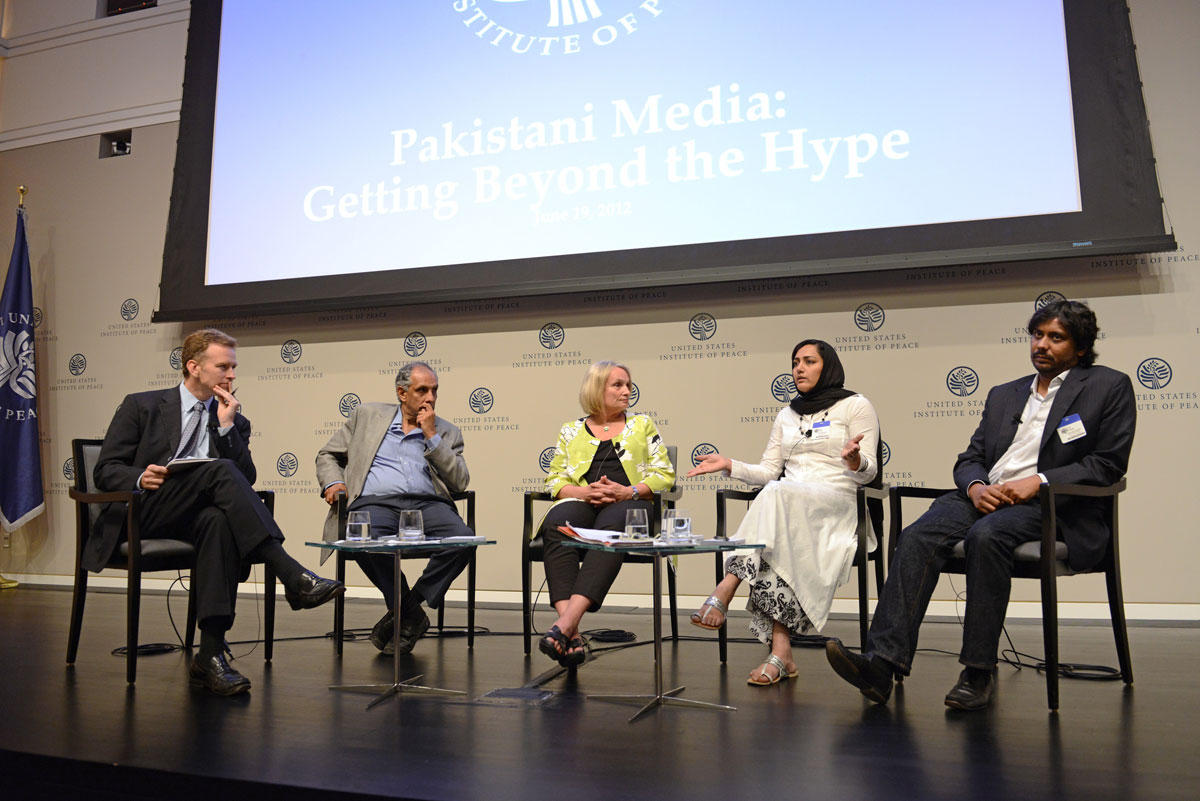The U.S. Institute of Peace hosted a group of senior Pakistani media representatives June 19 to discuss the complex role that the new Pakistani media plays in shaping both domestic and international policies.

 The U.S. Institute of Peace (USIP) hosted a group of senior Pakistani media representatives June 19 in a discussion that examined the ways in which the South Asian country’s media are “often at the eye of one storm or another,” as Sheldon Himelfarb, director of USIP’s Center of Innovation for Media, Conflict and Peacebuilding, put it. At a forum titled “Pakistani Media: Getting Beyond the Hype,” Himelfarb said the country’s media are both praised as a vibrant force for good and vilified as corrupt and a source of violent extremist rhetoric. “The truth, of course, lies somewhere in between,” he said.
The U.S. Institute of Peace (USIP) hosted a group of senior Pakistani media representatives June 19 in a discussion that examined the ways in which the South Asian country’s media are “often at the eye of one storm or another,” as Sheldon Himelfarb, director of USIP’s Center of Innovation for Media, Conflict and Peacebuilding, put it. At a forum titled “Pakistani Media: Getting Beyond the Hype,” Himelfarb said the country’s media are both praised as a vibrant force for good and vilified as corrupt and a source of violent extremist rhetoric. “The truth, of course, lies somewhere in between,” he said.
The Pakistani media representatives appearing at USIP were Imran Aslam, president and chief content officer of Geo TV; Cyril Almeida, assistant editor of Dawn; and Asma Shirazi, senior anchor and producer at Samaa TV. Former U.S. Ambassador to Pakistan Wendy Chamberlain and Aakif Ahmad, a representative of the Leadership Team of the U.S.-Pakistan Leaders Forum, offered additional comment. Steve Inskeep, a co-host of National Public Radio’s “Morning Edition” and author of “Instant City: Life and Death in Karachi,” moderated.
USIP has been deeply engaged in conflict-related issues involving the Pakistani media. Its Priority Grant Competition (PGC) for Pakistan aims at strengthening civil society capacities for conflict prevention and promotes greater understanding of issues related to identity, tolerance, diversity and sectarian extremism through education, training, research and the media. The PGC considers the Pakistani media to be a key, emerging agent of social change with a critical role in conflict prevention and peacebuilding. In recent years, PGC has funded seven Pakistani civil society organizations for projects that include training of journalists in conflict reporting, research on jihadi print media, fostering dialogue among youth and women through media programming and support to a civil society-led radio campaign to offer a counter-narrative to extremist radio propaganda.
USIP is also working with local research partners to conduct content analysis of popular Pakistani media and audience research on attitudes about content that some may characterize as sensational or extreme. This research will inform high-level dialogues led by Pakistani media owners and senior media managers, with the objective of developing ground-up, evidence-based projects to redress issues emerging from the research.
Explore Futher
- Learn more about USIP's work in Pakistan
- Learn about the Center for Media, Conflict, and Peacebuilding